I hate to be a bearer of bad news, but this, for many BookNotes readers, isn’t pleasant, no matter what “side” one is on in the debacle. I suppose some of our faithful BookNotes readers won’t care much, but I’m sure many do. I refer to the situation where Princeton Theological Seminary rescinded the annual Abraham Kuyper Award Prize that was to be given this year to Rev. Timothy Keller, rescinded due to his own views and involvement in a denomination that does not permit the ordination of women and is less than fully welcoming of persons within the LGBTQ community. Awarding someone with such views — even if an otherwise admirable public figure and successful church planter — seemed inconsistent with the task at Princeton which includes preparing women for ordained ministry. Here is the fairly plain-spoken announcement by the President of PTS about rescinding the award.

Here is just one example of the outcry offered in protest of Keller by Princeton alum and friends, this one by PC(USA) pastor Carol Howard Merritt, who has a new book out all about how the church has too often hurt people with a toxic judgmentalism and a harshly rigid sort of dogmatism. I think it is woefully unfair to caricature Keller’s position about gender roles as she does here, but she herself has encountered real spiritual abuse (from a rather different tribe that taught male dominion in a manner that Keller does not) so one must at least acknowledge the integrity of her advocacy, based on real experiences she has encountered and the stories of people that she knows. I want to listen when she writes, “I will lament for my sisters who have been maligned and abused. So much
of my ministry has been dedicated to aiding the victims of these
poisonous beliefs. In these difficult days, when our president says that
women’s genitalia is up for grabs by any man with power and
influence, I hoped that my denomination would stand up for women, loud
and clear.” Apparently her on-line piece in the Christian Century helped convince PTS President Craig Barnes to rescind the award.
Here is another important piece written by a PTS alum that is worth reading if you want to understand the outcry.
I don’t want to weigh in much — this is a book review newsletter, after all, and we’re trying to make a living getting you to send us orders — but I cannot shake this sense that I’m to write about this.
You may know (and if you read my lengthy review of Rod Dreher’s The Benedict Option you maybe picked it up if you haven’t before) that I am not where Keller and the PCA would be on these issues. Beth and I are active in a moderate PC(USA) church and one of my own beloved pastors — and a very good preacher — is a woman with a degree from Princeton. We rejoice in her call to ministry and gladly honor her as our Teaching Elder, as the Presby nomenclature has it. I understand those who thought it odd that the Seminary would honor one who apparently thinks that many persons among the student body should be disallowed in their quest for pastoral ministry.
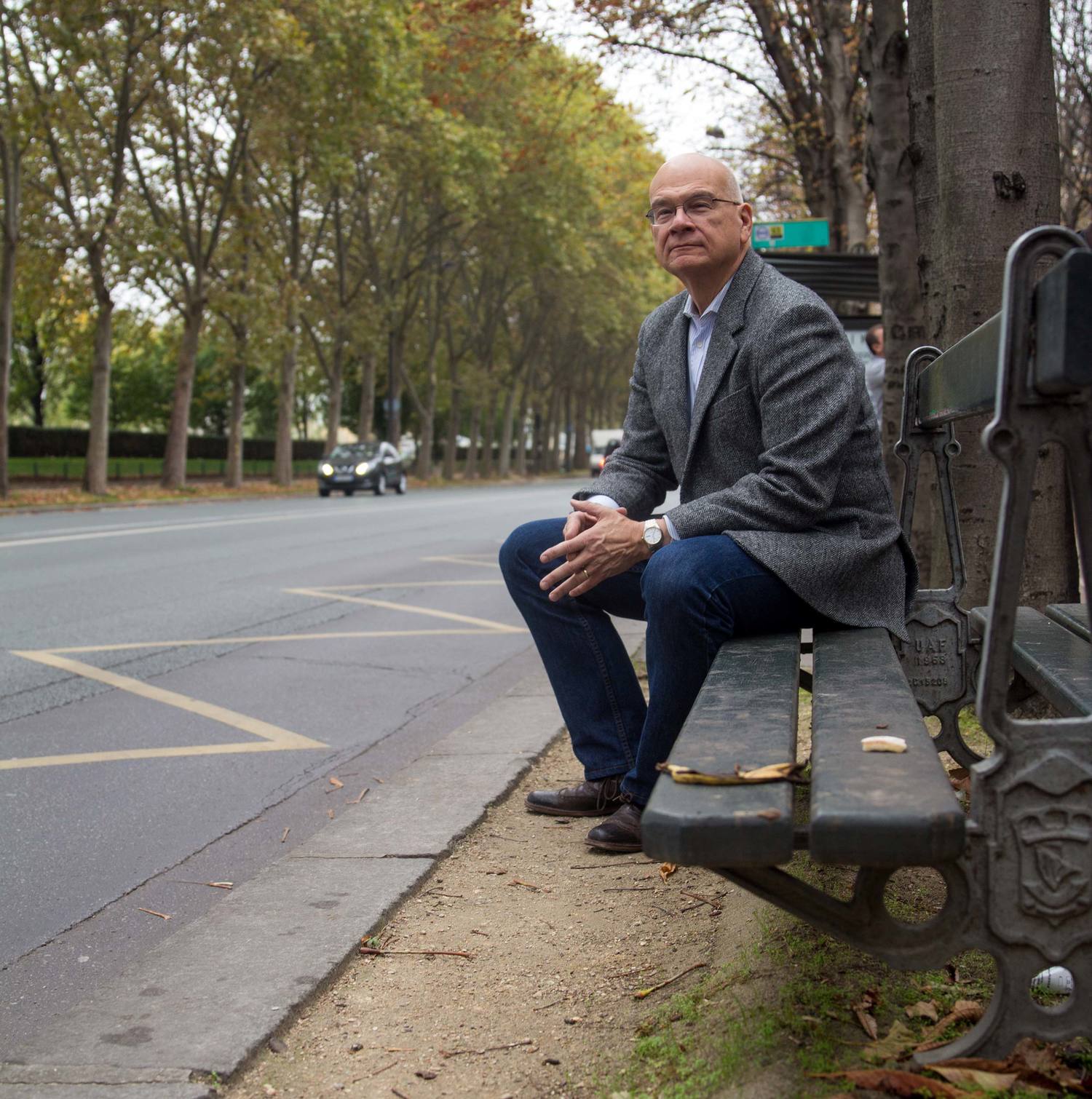 However, we respect Tim Keller immensely and have had good conversations with him on occasions over the years; we have had the opportunity to set up book displays at various events at the church he pastors, Redeemer Presbyterian in New York City. It is a great privilege and deep joy which we have not taken lightly and they have always, always, treated us very well. There is one video clip on line of Keller speaking at a large hall in Manhattan and if you look carefully you can see hundreds of books propped up at his feet — our Hearts & Minds resources display at the edge of the stage. I have to admit this makes me smile and Beth and I both love telling how we’ve worked with good folks who have become friends there at Redeemer.
However, we respect Tim Keller immensely and have had good conversations with him on occasions over the years; we have had the opportunity to set up book displays at various events at the church he pastors, Redeemer Presbyterian in New York City. It is a great privilege and deep joy which we have not taken lightly and they have always, always, treated us very well. There is one video clip on line of Keller speaking at a large hall in Manhattan and if you look carefully you can see hundreds of books propped up at his feet — our Hearts & Minds resources display at the edge of the stage. I have to admit this makes me smile and Beth and I both love telling how we’ve worked with good folks who have become friends there at Redeemer.
I hate to sound snarky but I do not know any church in my own denomination who has had such success in attracting serious-minded young adults as has Redeemer; I don’t myself know of any PC(USA) congregation who has so many sharp women involved in significant aspects of the church’s ministry, and who embodies such ethnic diversity. No church I know is as sophisticated in its work within its place — in Redeemer’s case, doing evangelism among sophisticated urban and professional elites, mentoring into mature faith those who are church-less or de-churched, bearing gospel witness among the marginalized and hurting in their neighborhoods as well as helping big city professionals think religiously about their callings in finance, law, the arts, education, science, technology, entertainment, and more. I know of no liberal or progressive church that goes out of their way to host events with speakers who are outside of their comfort zone, who willingly listen on occasion to non-Christian pundits and social critics as does Redeemer under the unique leadership of Reverend Keller.
Again, I disagree with their stance on the role of women elders and I suspect I disagree with the nature of their relationships with the GLTBQ+ community, although I cannot say for sure as I do not know about that. I think many who “on paper” are all inclusive and outspoken and allied may, in practice, have fewer relationships with gay and lesbian folk than do the members of Redeemer, despite their convictions about same-sex relations as disordered. We’ve not been there enough to say, but I wouldn’t presume the worst, as some progressive bloggers have. It sort of reminds me of Jesus’
parable in Matthew 21 about two sons. One said the right thing but
didn’t do it. And vice versa.
When some call Keller “loud” I realize they must never have met the man. When they accuse Redeemer of being harmful to women, I suspect they don’t know how many very thoughtful, strong, women are on staff at the church.
And, anyway, Keller and his ministry is known (for those who know anything about them) for encouraging women to be leaders in various sectors of society, from politics to medicine, from finance to scholarship. This is a point nicely made by Richard Mouw in his own important piece about the Princeton Kuyper Award ordeal. Here is a newly added link to a piece by Katherine Leary Alsdorf who admits to disagreements about Rev. Keller’s theology of gender roles, but says how qualified he would have been for the Kuyper Award. It is worth reading.
Okay, I’ve already said more than I intended. My point is that we carry a very wide variety of books here and sincerely recommend liberationist/progressive readings and also sincerely recommend Keller’s good books. It is not that we are confused but that we truly value much in both camps. And in this case, we appreciate the concerns on both sides. We have friends on both sides, and it hurts all around. At the very least, we think reading carefully will help us be fair as we see what it is we agree and disagree about; reading widely helps us avoid the sins of caricature and might move us towards reconciliation. Reading widely and serving a variety of corners of the big church has made me lean towards a both/and view, less either/or.
I hope we are not alone in that both/and space. I have to admit it feels rather lonely.
I’ll admit that I’ve got what some call “the feels” about this; I am in touch with acute distress as I reflect on it; my heart races as I read some of the many passionate pieces that have been posted. This episode breaks my heart although I suppose it was inevitable. Keller is not in keeping with the vision of PTS on the matter of gender. And the ideological left is often not forgiving. It was good of Keller, I thought, to agree go to PTS in the first place — some conservative evangelicals don’t even want to be seen on the seminary campuses of mainline denominations and I suspect he himself had to convince some of his PCA friends and supporters that this was a legitimate rapprochement. And now they may be saying “we told you so.” So it goes. Although I didn’t agree with every sentence, I appreciated Jonathan Merritt’s piece that captured this viewpoint well. He calls on more progressive types (with whom he identifies) to champion true diversity and a much wider conversation under a bigger tent. I’m for that.
ABRAHAM KUYPER
But here is what is somewhat lost in the high-profile discussions (again, raised by the Richard Mouw column, above.)
The Award rescinded by President Barnes was not being given, in the most broad sense, by Princeton Theological Seminary. It was to be given by the Abraham Kuyper Center for Public Theology. It is actually called “The Abraham Kuyper Prize for Excellence in Reformed Theology and Public Life.”
And that, I suggest, is the even more important question: do many people care about the work of the Abraham Kuyper Center for Public Theology at PTS and is that sort of robust, culturally-engaged, neo-Calvinism, gaining any traction? In a divided Reformed, Presbyterian tradition — divided between more strict neo-Puritans and the growing PCA and more progressive mainliners in the declining PC(USA) — can any of this Dutch Kuyper stuff help? And can Keller and his City-to-City project help us all understand the distinctives of that theological strain? And is that a good thing or not?
Such a Kuyperian slant and “all of life redeemed” worldview, I would think, could help conservative evangelicals and doctrinaire PCA types gain a broader sort of cultural engagement (by drawing, just for instance, on Kuyper’s extensive teaching on “common grace” and the common good) and it can also help progressives resist their up-to-their-steeples accommodation to secular leftist ideas and practices. Old man Kuyper and his colorful life can offer a corrective for us all to get out of our tendencies to be primarily left-wing or right-wing by providing an imaginative and faithful third way.
Kuyper — like Luther or St. Francis or Wilberforce or Andre Trocme — can do this for us because (a) they write from another place and time and are not beholden to our own social imaginaries (such as a left vs right continuum) and, (b) because as a matter of principle, Kuyper talked about finding an alternative Christian way of thinking and being in the modern world, beyond conventional arrangements. It was, as we say, his thing.
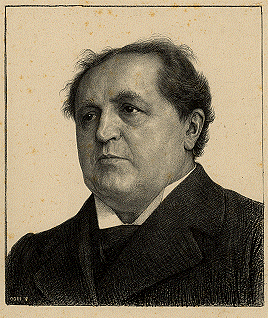 Kuyper’s prolific late 19th/early 20th century theological and church work was eclipsed by his cultural initiatives and political activism, leaving a legacy of distinctively Christian institutions, a world class Christian university, a daily newspaper, an interest in the arts, a complex and nuanced critique of capitalism, a values-inspired labor union, and, of course, a Christian Democratic political party through which he became Prime Minister. For most of his life, although pious and theologically prolific, he did much of his thinking “on the run” while engaged in rigorous public debates. Perhaps in this sense he might remind one of William Wilberforce.
Kuyper’s prolific late 19th/early 20th century theological and church work was eclipsed by his cultural initiatives and political activism, leaving a legacy of distinctively Christian institutions, a world class Christian university, a daily newspaper, an interest in the arts, a complex and nuanced critique of capitalism, a values-inspired labor union, and, of course, a Christian Democratic political party through which he became Prime Minister. For most of his life, although pious and theologically prolific, he did much of his thinking “on the run” while engaged in rigorous public debates. Perhaps in this sense he might remind one of William Wilberforce.
I don’t know how all of his old books ought to inform our efforts for cultural renewal and social justice today; he was a man of his times and had huge blind spots. Still, Abraham Kuyper’s influence on my own thinking (or my own feeble appreciation of his general ethos and vision, at least, as explained to me by others) is part of what gives me the heebie-jeebies about Dreher’s The Benedict Option book and his BenOp movement, as described in my big review, here. You see, Kuyper’s influence on the thinking of people I know is what created stuff like the CCO’s wonderful Jubilee Conference, the extraordinary For the Life of the World DVD curriculum, the Redeemer Presbyterian Center for Faith and Work (where, by the way, I did the “industry specific” book recommendations), the non-partisan Center for Public Justice (founder James Skillen himself was a Kuyper Award prize-winner, by the way) and, well, this little bookstore on Main Street in Dallastown, Pennsylvania.
 No dualisms between the sacred and secular? All of life redeemed? We are culture-makers? Salvation means creation regained? The drama of Scripture is a four-chapter story, sometimes described as creation/fall/redemption/restoration? The integration of faith and scholarship? We must learn to see through the lens of a Christian worldview? You Are What You Love? These are all big picture slogans that carry transforming visions that have become increasingly embraced within evangelicalism, because, as religious historian George Marsden once quipped, “We are all Kuyperians now.” Whether we know it or not.
No dualisms between the sacred and secular? All of life redeemed? We are culture-makers? Salvation means creation regained? The drama of Scripture is a four-chapter story, sometimes described as creation/fall/redemption/restoration? The integration of faith and scholarship? We must learn to see through the lens of a Christian worldview? You Are What You Love? These are all big picture slogans that carry transforming visions that have become increasingly embraced within evangelicalism, because, as religious historian George Marsden once quipped, “We are all Kuyperians now.” Whether we know it or not.
In fact, as David Naugle so meticulously explored in years of research, the very word worldview (just for one instance) entered the English lexicon because of philosophers in the line of Kuyper. See Naugle’s fantastic big book, Worldview: The History of a Concept (Eerdmans; $34.00) for an amazing bit of sleuthing on the genealogy of that idea and how faith leaders — from Francis Schaeffer to James Sire to Nancy Pearcey to Brian Walsh — appropriated the concept in different ways and for different ends.
You see, a burning question for me — beyond Keller’s denomination’s view of women’s ordination and the admittedly complex analysis of Biblical texts that should shape our determination of that question — is this other one: is Keller a Kuyperian?
For the record, not all the winners of previous Kuyper Awards were Kuyperians. Heck, some were not Christians. Here is a list of past winners of the Kuyper Award, and links to some of their academic talks.
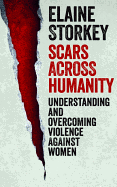 Last year our friend Elaine Storkey — author, most recently, of Scars Across Humanity: Understanding and Overcoming Violence Against Women — received the Award. I hope those expressing their legitimate concern about the justice deserved by women supported the event last year. And I hope they bought her book. I know we have not sold many although we have highlighted it often; it is very important! Storkey is an articulate spokesperson from the UK for the broad Kuyperian vision and has written widely on gender inequality for most of her professional career. (Even at the Jubilee conference in Pittsburgh, too, years ago, where she did a main stage talk.)
Last year our friend Elaine Storkey — author, most recently, of Scars Across Humanity: Understanding and Overcoming Violence Against Women — received the Award. I hope those expressing their legitimate concern about the justice deserved by women supported the event last year. And I hope they bought her book. I know we have not sold many although we have highlighted it often; it is very important! Storkey is an articulate spokesperson from the UK for the broad Kuyperian vision and has written widely on gender inequality for most of her professional career. (Even at the Jubilee conference in Pittsburgh, too, years ago, where she did a main stage talk.)
Anyway, it has been a good string of very impressive honorees, diverse in ethnicity, social location, religion, and overall perspective.
And that is how it should be since another word Kuyperians introduced into more popular usage — long before secular journalists picked up on it decades ago — is pluralism. Anyone who knows the main political thinker who influenced Prime Minister Kuyper (Groen Van Prinsterer) knows that they talked a lot about pluralism. One cannot imagine a robust Reformed or neo-Calvinist social theory without resorting to the notion of civil and principled pluralism.
(Indeed, this is part of the topic of James K.A. Smith’s scholarly, Herman Bavinck Lecture given in Kampen, Holland, last summer, entitled, “Reforming Public Theology: Neo-calvinism and Pluralism” which, we can hope, will make it into his third volume of his brilliant “Cultural Liturgies” series due out this year, which will be called Awaiting the King. You can PRE-ORDER that from us, too, btw, but we’re not sure when it is being released.)
So therein lies one tension: the evangelical right and the more liberal mainline both seem to too often miss the nuances of pluralism. Hence, both have a hard time with civility, with getting along with others. They cry out and lament and protest, and I get that; it is my style, often, too. And sometimes it is the right thing to do, to just say no. Heaven knows I’ve spent a lot of my time on picket lines doing just that. But Kuyper maybe had something insightful to offer a society that struggles to learn to live well together, amidst our differences.
And so, I’d like to share with you a handful of books that you should note — maybe even buy and someday read — to help us make sense of this sad brouhaha. Firstly, we have to understand a bit about Kuyper. And then a bit about Keller.
BOOKS BY AND ABOUT ABRAHAM KUYPER
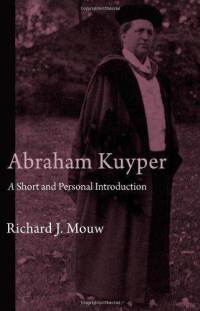 Abraham Kuyper: A Short and Personal Introduction Richard Mouw (Eerdmans) $16.00 Oh how I wish folks would order this from us. They use it at Redeemer’s Gotham Fellows program (I know because they order them from us) and it serves as an easy introduction to the main strengths of the hefty, Dutch public intellectual. And if anybody can help us see easily why this matters, it is the always interesting Rich Mouw. As noted above, Mouw himself was an Kuyper Center honoree, quite deservedly so.
Abraham Kuyper: A Short and Personal Introduction Richard Mouw (Eerdmans) $16.00 Oh how I wish folks would order this from us. They use it at Redeemer’s Gotham Fellows program (I know because they order them from us) and it serves as an easy introduction to the main strengths of the hefty, Dutch public intellectual. And if anybody can help us see easily why this matters, it is the always interesting Rich Mouw. As noted above, Mouw himself was an Kuyper Center honoree, quite deservedly so.
James K.A. Smith writes of it:
“This marvelous little book pulls off an astounding feat: though it is
both compact and accessible, it also gives us the whole Kuyper. Too
often we get Kuyper in slices: folks gravitate to a ‘side’ of Kuyper,
adopting his theology of culture but neglecting his emphasis on the
church, or picking up common grace but neglecting antithesis. But Mouw,
with typical wit and warmth, introduces us to Kuyper in all his
multifaceted richness. A gift for the next generation.”
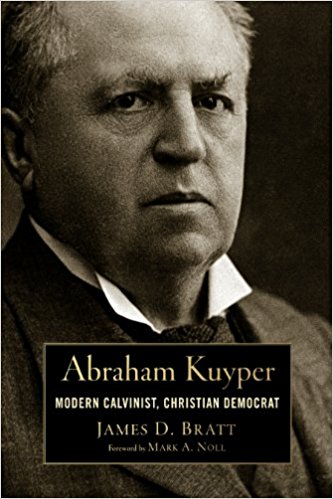 Abraham Kuyper: Modern Calvinist, Christian Democrat James Bratt (Eerdmans) $32.00 I don’t know Jim Bratt well enough to say this for sure, but we crossed paths when we lived in Pittsburgh in the early 80s, I believe, and he, like many of us in Reformed circles there in those years, heard of Kuyper from a flamboyant Dutch theologian and philosopher who could quote Kuyper, in the original, in his sleep. And tell you why another Dutch theologian of culture (say, Klaas Schilder) was equally important. Anyway, like many of us, Bratt took a life-long interest in this historic Dutch strain of Reformed theology and has written what is doubtlessly the definitive biography of the great Father Abraham. Many say that Abraham Kuyper was truly one of the most extraordinary figures in Western Christian history and we should be very glad for this major, historic biography.
Abraham Kuyper: Modern Calvinist, Christian Democrat James Bratt (Eerdmans) $32.00 I don’t know Jim Bratt well enough to say this for sure, but we crossed paths when we lived in Pittsburgh in the early 80s, I believe, and he, like many of us in Reformed circles there in those years, heard of Kuyper from a flamboyant Dutch theologian and philosopher who could quote Kuyper, in the original, in his sleep. And tell you why another Dutch theologian of culture (say, Klaas Schilder) was equally important. Anyway, like many of us, Bratt took a life-long interest in this historic Dutch strain of Reformed theology and has written what is doubtlessly the definitive biography of the great Father Abraham. Many say that Abraham Kuyper was truly one of the most extraordinary figures in Western Christian history and we should be very glad for this major, historic biography.
Hey, for what it is worth, for serious scholars or fans, we also stock another Kuyper bio published by Eerdmans, the luxurious Abraham Kuyper: A Pictorial Biography by Jan De Bruijn ($40.00.) And, a nice little collection of fascinating letters that Kuyper wrote back to his wife during his extended stay in the US in 1898. See Kuyper in America: This Is Where I Was Meant to Be edited by George Harinck (Dordt College Press; $11.95)
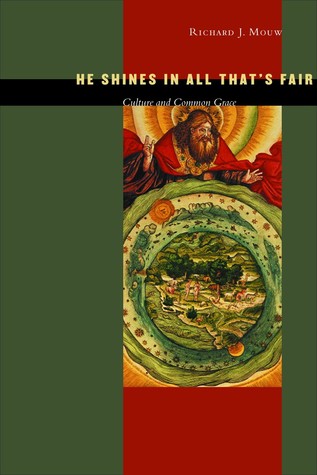 He Shines in All That’s Fair: Culture and Common Grace Richard Mouw (Eerdmans) $15.95 I think I tossed this off in passing in my review of Dreher’s Benedict Option book saying I’d love to hear him ruminate on these wild ideas of Kuyper as presented so nicely by Rich Mouw. Does God love jazz music, a good golf putt, the flight of a hawk? That is, are there seemingly secular or non-consequential and non-religious things that make up a good life that pleases God? And if so, does affirming those things and being active in those very things — playing, learning, art appreciation, making stuff — matter for eternity? Kuyper’s view of common grace does not negate the need for saving faith in Christ,but it does offer generative notions to sustain greater involvement in the world, building bridges with others who are made in God’s image, advancing a generally positive view of life in the world and our callings to be engaged well in culture. I have mentioned this book often, and think it should be better known among us.
He Shines in All That’s Fair: Culture and Common Grace Richard Mouw (Eerdmans) $15.95 I think I tossed this off in passing in my review of Dreher’s Benedict Option book saying I’d love to hear him ruminate on these wild ideas of Kuyper as presented so nicely by Rich Mouw. Does God love jazz music, a good golf putt, the flight of a hawk? That is, are there seemingly secular or non-consequential and non-religious things that make up a good life that pleases God? And if so, does affirming those things and being active in those very things — playing, learning, art appreciation, making stuff — matter for eternity? Kuyper’s view of common grace does not negate the need for saving faith in Christ,but it does offer generative notions to sustain greater involvement in the world, building bridges with others who are made in God’s image, advancing a generally positive view of life in the world and our callings to be engaged well in culture. I have mentioned this book often, and think it should be better known among us.
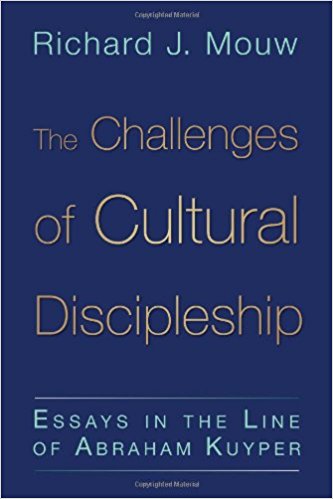 The Challenges of Cultural Discipleship: Essays in the Line of Abraham Kuyper Richard Mouw (Eerdmans) $20.00 This starts to get a bit deep, I must say; here are thirteen essays that are uniquely neo-Calvinist, evaluating and engaging some of the unique issues and theories that circle around the air of those in the heritage of Abraham Kuyper and his tribe. As it says in the promo copy: “In this volume Mouw provides the scholarly backstory to his popular books as he interprets, applies, expands on — and at times even corrects — Kuyper’s remarkable vision for faith and public life.” Pretty heavy stuff. Wow.
The Challenges of Cultural Discipleship: Essays in the Line of Abraham Kuyper Richard Mouw (Eerdmans) $20.00 This starts to get a bit deep, I must say; here are thirteen essays that are uniquely neo-Calvinist, evaluating and engaging some of the unique issues and theories that circle around the air of those in the heritage of Abraham Kuyper and his tribe. As it says in the promo copy: “In this volume Mouw provides the scholarly backstory to his popular books as he interprets, applies, expands on — and at times even corrects — Kuyper’s remarkable vision for faith and public life.” Pretty heavy stuff. Wow.
By the way, although not as explicitly Kuyperian, if you are attracted to shorter essays and stimulating talks in this vein, see James K.A. Smith’s marvelous collection Discipleship in the Present Tense: Reflections on Faith and Culture (Calvin College Press; $14.99.) A learned delight.
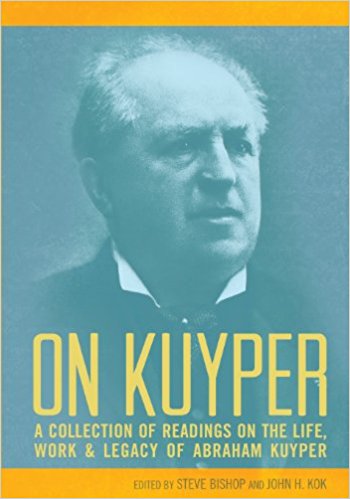 On Kuyper: A Collection of Readings on the Life, Work & Legacy of Abraham Kuyper edited by Steve Bishop and John H. Kok (Dordt College Press) $36.00 This. I mean it: this. This is a magisterial, unique, colorful, scholarly, flamboyant and at times nearly mind-boggling collection of very important pieces about Kuyper. It is slightly oversized and over 475 pages. Some are reprints from years ago, some are in print for the first time. They evaluate Kuyper and Kuyperian philosophy and explore the implications of his thought-system for (among other things) the church, culture, gender, politics, education, fashion, evolution, and more. There is discussion about the implications of common grace, sphere sovereignty, pluralism, all somehow giving tribute to this robust thinker who promoted the Lordship of Christ over all zones of life.
On Kuyper: A Collection of Readings on the Life, Work & Legacy of Abraham Kuyper edited by Steve Bishop and John H. Kok (Dordt College Press) $36.00 This. I mean it: this. This is a magisterial, unique, colorful, scholarly, flamboyant and at times nearly mind-boggling collection of very important pieces about Kuyper. It is slightly oversized and over 475 pages. Some are reprints from years ago, some are in print for the first time. They evaluate Kuyper and Kuyperian philosophy and explore the implications of his thought-system for (among other things) the church, culture, gender, politics, education, fashion, evolution, and more. There is discussion about the implications of common grace, sphere sovereignty, pluralism, all somehow giving tribute to this robust thinker who promoted the Lordship of Christ over all zones of life.
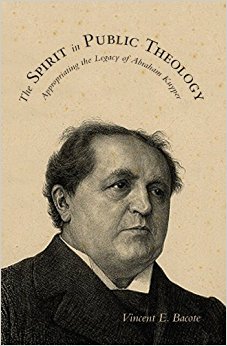 The Spirit in Public Theology: Appropriating the Legacy of Abraham Kuyper Vincent Bacote (Wipf & Stock) $20.00. Bacote is an amazing professor and a public intellectual in his own right. We have hosted him to present on his little book The Political Disciple which, actually, has some Kuyperian fingerprints on it. But his is more detailed Kuyper book is an important contribution to Kuyper scholars. Here, Bacote explores both Kuyper public theology and ties it to his major work on the Holy Spirit. And, as the sub-title suggests, Bacote makes some keen observations about how to appropriate this wisely today. I might note that since some have understandably leveled some criticisms against how South African thinkers perhaps used some of Kuypers ideas to undergird their devious apartheid system, Bacote is himself an African American and obviously takes these concerns seriously. No one should overlook injustices or sinful errors of past thinkers, and Bacote helps us navigate some of this. It’s a useful, thoughtful book.
The Spirit in Public Theology: Appropriating the Legacy of Abraham Kuyper Vincent Bacote (Wipf & Stock) $20.00. Bacote is an amazing professor and a public intellectual in his own right. We have hosted him to present on his little book The Political Disciple which, actually, has some Kuyperian fingerprints on it. But his is more detailed Kuyper book is an important contribution to Kuyper scholars. Here, Bacote explores both Kuyper public theology and ties it to his major work on the Holy Spirit. And, as the sub-title suggests, Bacote makes some keen observations about how to appropriate this wisely today. I might note that since some have understandably leveled some criticisms against how South African thinkers perhaps used some of Kuypers ideas to undergird their devious apartheid system, Bacote is himself an African American and obviously takes these concerns seriously. No one should overlook injustices or sinful errors of past thinkers, and Bacote helps us navigate some of this. It’s a useful, thoughtful book.
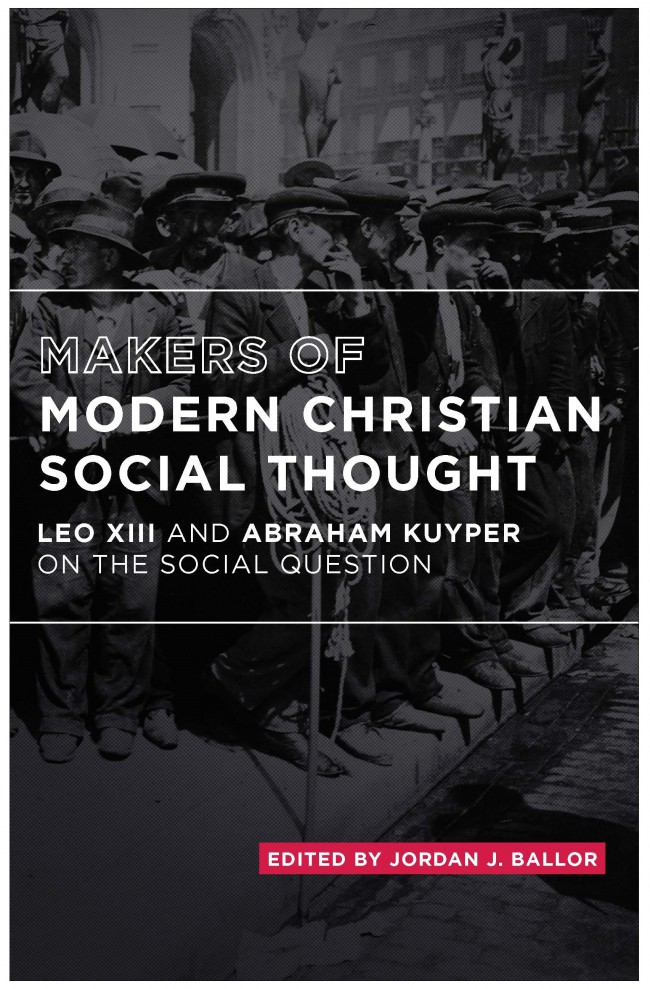 Makers of Modern Christian Social Thought: Leo XIII and Abraham Kuyper on the Social Question Jordon Ballor (Acton Institute for the Study of Religion and Liberty) $14.95 This is an extraordinary book, one that covers a topic some of us have alluded to for years — namely, that there is much overlap between Pope Leo XIII and Kuyper. Leo’s pivotal social encyclical Rerum Novarum and Kuyper’s dramatic speech, published in English as Christianity and the Class Struggle and, later, as The Problem of Poverty) are both very, very important and we are indebted to the always brilliant Jordan Ballor for doing this good work, comparing and contrasting these two somewhat connected social justice traditions.
Makers of Modern Christian Social Thought: Leo XIII and Abraham Kuyper on the Social Question Jordon Ballor (Acton Institute for the Study of Religion and Liberty) $14.95 This is an extraordinary book, one that covers a topic some of us have alluded to for years — namely, that there is much overlap between Pope Leo XIII and Kuyper. Leo’s pivotal social encyclical Rerum Novarum and Kuyper’s dramatic speech, published in English as Christianity and the Class Struggle and, later, as The Problem of Poverty) are both very, very important and we are indebted to the always brilliant Jordan Ballor for doing this good work, comparing and contrasting these two somewhat connected social justice traditions.
Here is what it says on the back:
Leo XIII’s encyclical on the relationship between capital and labor (Rerum Novarum) and Abraham Kuyper’s speech to the first Christian Social Congress (“The Social Question and the Christian Religion”), both published in 1891, are foundational sources for subsequent Christian social thought in their respective traditions-Roman Catholic and Reformed. This volume, in celebration of the 125th anniversary of these two landmark publications, includes authoritative English translations of these works and an introduction that outlines their context and significance. The thought of these two theologians-one an Italian scholar-pope and the other a Dutch Reformed pastor, professor, and politician-provide enduring wisdom for developing and articulating a Christian witness in the modern world.
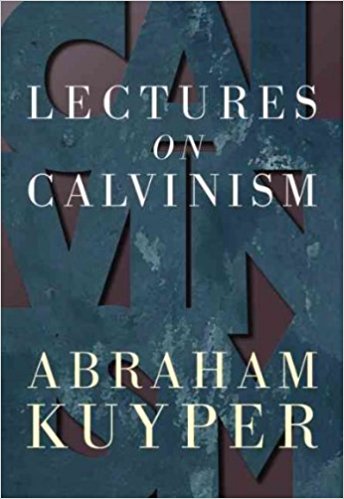 Lectures on Calvinism Abraham Kuyper (Eerdmans) $18.00 This is the book that first introduced me to Kuyper and it is dry and complex, written in the style of public addresses at Princeton at the turn of the 19th century into the 20th. These were given in 1898 as the “Stone Lectures” and the rocked the world, changing much about Presbyterianism, lasting even to today. Alas they are not thrilling for most readers. These lectures explore the notion that God is sovereign, and therefore, we should honor Christ as King over all of life — the English translation renders the first chapter “Christianity as a Life System.” He specifically looks at science, the arts, commerce, and education and the future — and hearing about it was life-changing for me. His complex lectures never turned me on, but the idea that religion is an all-encompassing world-and-life view and that Calvinism’s importance is therefore more than theological debates about predestination, but about God’s rulership over all creation, still resonates today.
Lectures on Calvinism Abraham Kuyper (Eerdmans) $18.00 This is the book that first introduced me to Kuyper and it is dry and complex, written in the style of public addresses at Princeton at the turn of the 19th century into the 20th. These were given in 1898 as the “Stone Lectures” and the rocked the world, changing much about Presbyterianism, lasting even to today. Alas they are not thrilling for most readers. These lectures explore the notion that God is sovereign, and therefore, we should honor Christ as King over all of life — the English translation renders the first chapter “Christianity as a Life System.” He specifically looks at science, the arts, commerce, and education and the future — and hearing about it was life-changing for me. His complex lectures never turned me on, but the idea that religion is an all-encompassing world-and-life view and that Calvinism’s importance is therefore more than theological debates about predestination, but about God’s rulership over all creation, still resonates today.
 Wisdom & Wonder: Common Grace in Science & Art Abraham Kuyper (Christian’s Library Press) $14.99 We were one of the first places to review this when it first came out a few years back and we still enjoy telling folks about it — and pointing out the very cool cover. This is a good way into Kuyper’s own writings on common grace, on how to address issues of the arts and sciences. Edited by Jordan Ballor and Stephen Grabill (yes, the guy in For the Life of the World) Wisdom & Wonder includes a foreword by Q founder Gabe Lyons and a great introduction by Wheaton College political theologian, Vincent Bacote. Serious, thoughtful, old-school theology of culture.
Wisdom & Wonder: Common Grace in Science & Art Abraham Kuyper (Christian’s Library Press) $14.99 We were one of the first places to review this when it first came out a few years back and we still enjoy telling folks about it — and pointing out the very cool cover. This is a good way into Kuyper’s own writings on common grace, on how to address issues of the arts and sciences. Edited by Jordan Ballor and Stephen Grabill (yes, the guy in For the Life of the World) Wisdom & Wonder includes a foreword by Q founder Gabe Lyons and a great introduction by Wheaton College political theologian, Vincent Bacote. Serious, thoughtful, old-school theology of culture.
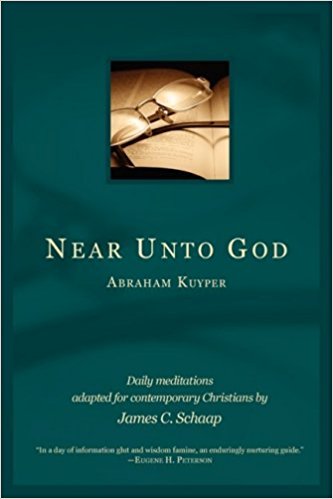 Near Unto God Abraham Kuyper (Dordt College Press) $17.00 This is a slightly modernized (by novelist James Schaap) and somewhat abridged edition of Kuyper’s beloved devotional based on the phrase from Psalm 73:28. I was moved and inspired by RIchard Mouw’s introduction, explaining how this deeply spiritual piety motivated not only the public activism and myriad of reforms of the busy Kuyper but of generations of Dutch Christian leaders in the 20th century. Dutch Reformed farmers and workers of all sort were inspired by this kind of Bible reflection causing them to start alternative schools and environmental stewardship organizations, labor unions based on reconciliation, magazines, mission agencies, inner city clinics, art groups and more.How good to know that their “all of life redeemed” worldview was driven by deep relationship with the God who is there, who cares, who wants to be near to us. A nice blurb on the front is by Eugene Peterson.
Near Unto God Abraham Kuyper (Dordt College Press) $17.00 This is a slightly modernized (by novelist James Schaap) and somewhat abridged edition of Kuyper’s beloved devotional based on the phrase from Psalm 73:28. I was moved and inspired by RIchard Mouw’s introduction, explaining how this deeply spiritual piety motivated not only the public activism and myriad of reforms of the busy Kuyper but of generations of Dutch Christian leaders in the 20th century. Dutch Reformed farmers and workers of all sort were inspired by this kind of Bible reflection causing them to start alternative schools and environmental stewardship organizations, labor unions based on reconciliation, magazines, mission agencies, inner city clinics, art groups and more.How good to know that their “all of life redeemed” worldview was driven by deep relationship with the God who is there, who cares, who wants to be near to us. A nice blurb on the front is by Eugene Peterson.
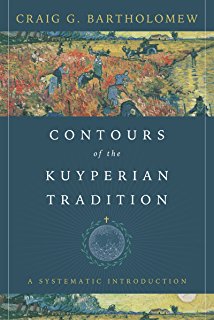 PRE-ORDER Contours of the Kuyperian Tradition: A Systematic Introduction Craig C. Bartholomew (IVP Academic) $40.00 I have been itching to see this since I heard about it a while ago, and I’ve not yet seen any of the manuscript. I can tell you this much: it is going to be academically sound and yet exciting. And important. When the publisher says Kuyper is “much discussed but little read” I think they are right, and there are reasons for that. Not unlike other great writers of the past, delving into older ways of writing is hard even for some scholars. We need a guide. We need some assistance. We need a teacher to tell us about it all. Philosopher, theologian, artist, farmer from South Africa, we have our guide here in Mr. Bartholomew. I cannot wait for this and suspect it is going to be a blessing to many. Agree or disagree with Kuyper — and some view him as too conservative and totalizing, and some view him as too liberal and pluralizing — this will be the indispensable resource to help us understand his importance, his legacy, and how many are working out his faith-based vision for just and healing multi-dimensional societal reform today in our own time and place. I’m hoping many are glad to hear about it, and will send us an order. It is due out in mid April, 2017 and we will be among the very first to have it, I’m sure.
PRE-ORDER Contours of the Kuyperian Tradition: A Systematic Introduction Craig C. Bartholomew (IVP Academic) $40.00 I have been itching to see this since I heard about it a while ago, and I’ve not yet seen any of the manuscript. I can tell you this much: it is going to be academically sound and yet exciting. And important. When the publisher says Kuyper is “much discussed but little read” I think they are right, and there are reasons for that. Not unlike other great writers of the past, delving into older ways of writing is hard even for some scholars. We need a guide. We need some assistance. We need a teacher to tell us about it all. Philosopher, theologian, artist, farmer from South Africa, we have our guide here in Mr. Bartholomew. I cannot wait for this and suspect it is going to be a blessing to many. Agree or disagree with Kuyper — and some view him as too conservative and totalizing, and some view him as too liberal and pluralizing — this will be the indispensable resource to help us understand his importance, his legacy, and how many are working out his faith-based vision for just and healing multi-dimensional societal reform today in our own time and place. I’m hoping many are glad to hear about it, and will send us an order. It is due out in mid April, 2017 and we will be among the very first to have it, I’m sure.
I like James Bratt’s good endorsement:
Abraham Kuyper began the neo-Calvinist movement in the Netherlands in
the late 1800s as a way to make classic Christianity speak with fresh
relevance to the modern world. Now, over a century later, Craig
Bartholomew has given us this clear, thorough overview of Kuyper’s
original insights, their further development, and their relevance in the
postmodern world. Both veterans of the movement and those new to it
will find here a concise presentation of the distinctive Kuyperian
themes–creation, worldview, and sphere sovereignty–as they
characteristically unfolded in Christian education, philosophy, and
political and cultural engagement. Best of all, Bartholomew lays out
where Kuyperians can learn from others–and how they might (and must)
recover the spirituality and saturation in Scripture that animated
Kuyper in the first place. Agree with Kuyper or not, this is the place
to go to learn, in brief, what he said, did, and wrought
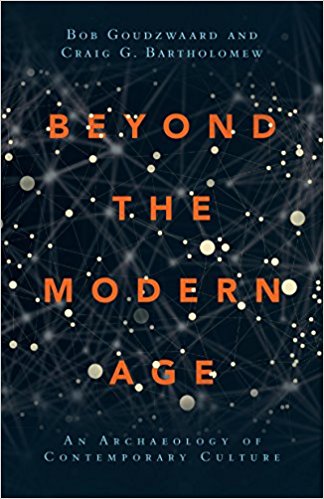 PRE-ORDER Beyond the Modern Age: An Archaeology of Contemporary Culture Bob Goudzwaard and Craig Bartholomew (IVP Academic) $30.00 If I were to name one contemporary interpreter of Kuyper’s broad vision, relating it with passion to the injustices of the modern world, it may be the delightfully pleasant scholar and ecumenically minded Dutch Kuyperian economist, Bob Goudzwaard. Goudzwaard was an elected Parliament Member (what we might call a Congressperson) in the Netherlands and helped draft some of the social policies of the modern version of Kuyper’s A-R Party, the Christian Democratic Appeal. Here he joins up with Biblical scholar and reformational philosopher Craig Bartholomew for a “architectonic” critique of modern global culture and the interlocking symptoms of our contemporary social crisis. Goudzwaard is known for his important work in economics and for his incisive critique of the idols of the age. This book — due out in early May 2017 — is going to be one of the most important books of the year. PRE-ORDER IT ON SALE FROM US TODAY.
PRE-ORDER Beyond the Modern Age: An Archaeology of Contemporary Culture Bob Goudzwaard and Craig Bartholomew (IVP Academic) $30.00 If I were to name one contemporary interpreter of Kuyper’s broad vision, relating it with passion to the injustices of the modern world, it may be the delightfully pleasant scholar and ecumenically minded Dutch Kuyperian economist, Bob Goudzwaard. Goudzwaard was an elected Parliament Member (what we might call a Congressperson) in the Netherlands and helped draft some of the social policies of the modern version of Kuyper’s A-R Party, the Christian Democratic Appeal. Here he joins up with Biblical scholar and reformational philosopher Craig Bartholomew for a “architectonic” critique of modern global culture and the interlocking symptoms of our contemporary social crisis. Goudzwaard is known for his important work in economics and for his incisive critique of the idols of the age. This book — due out in early May 2017 — is going to be one of the most important books of the year. PRE-ORDER IT ON SALE FROM US TODAY.
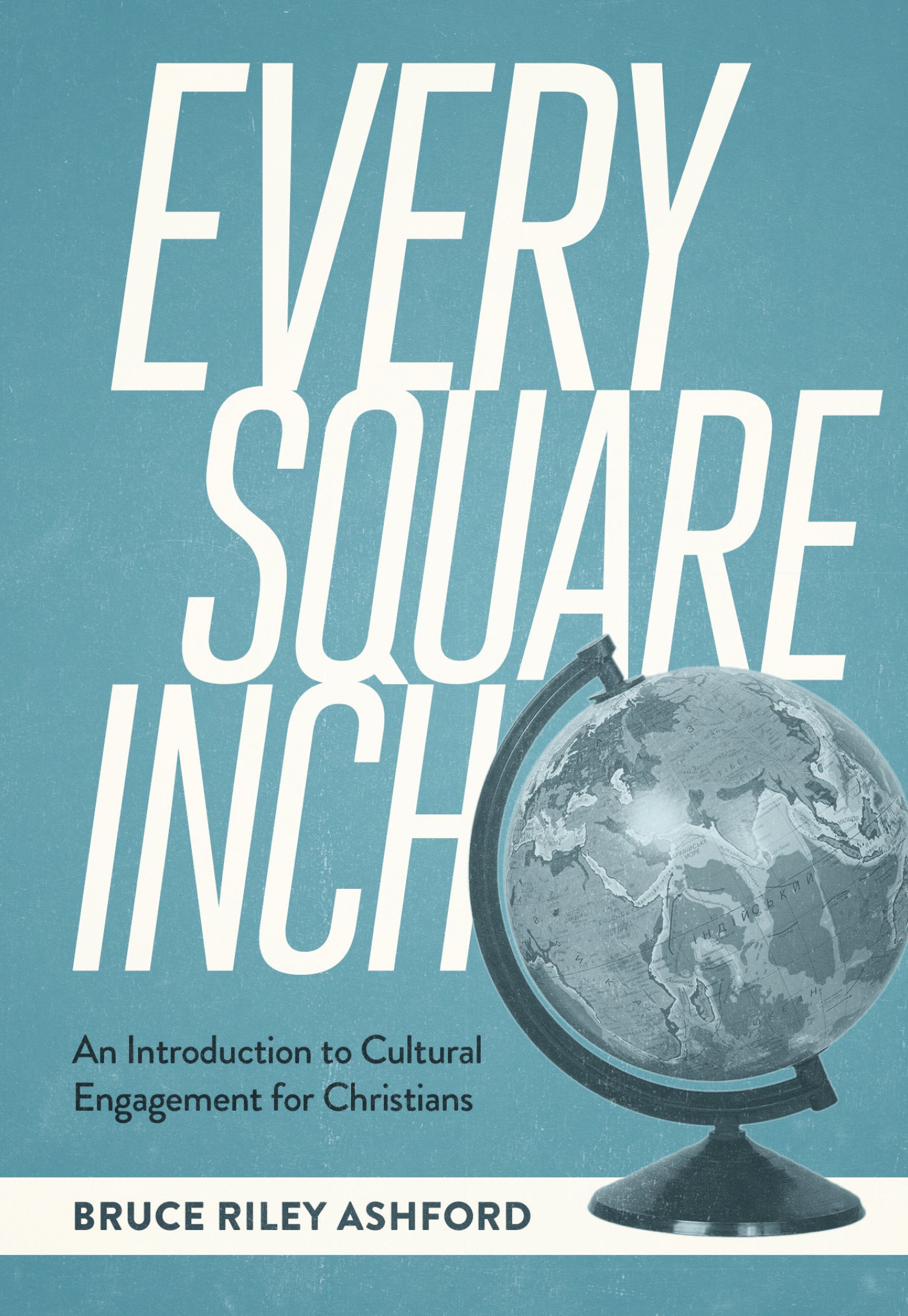 Every Square Inch: An Introduction to Cultural Engagement for Christians (Lexham Press) $14.99 Okay, this little hardback isn’t exactly a bio of Kuyper, or even about him, exactly, but his Dutch fingerprints are all over it. It looks at what contemporary neo-Calvinists in the line of Kuyper are thinking about culture, about engagement with the world from a radically Christian life perspective, and how to relate faith and public life in principled but gracious ways. It tends a bit conservative at times and some readers will not agree with it all, but it captures much about what is going on it this stream of renewal within both Reformed and, interestingly, some Southern Baptist circles. A nice little read, good to know about and helpful for beginners.
Every Square Inch: An Introduction to Cultural Engagement for Christians (Lexham Press) $14.99 Okay, this little hardback isn’t exactly a bio of Kuyper, or even about him, exactly, but his Dutch fingerprints are all over it. It looks at what contemporary neo-Calvinists in the line of Kuyper are thinking about culture, about engagement with the world from a radically Christian life perspective, and how to relate faith and public life in principled but gracious ways. It tends a bit conservative at times and some readers will not agree with it all, but it captures much about what is going on it this stream of renewal within both Reformed and, interestingly, some Southern Baptist circles. A nice little read, good to know about and helpful for beginners.
And, of course, one should always consider going to the primary source, reading the vast historic work of the good Doctor Kuyper himself, beyond the popular ones listed above. Just like we extol the writings of Augustine or Aquinas, Luther or Calvin, Theresa or Julian, Barth or Bonhoeffer, Dorothy Sayers or C.S. Lewis, this is classic, heady, important stuff, right from the horses mouth.
We also carry other books about Kuyper and his legacy, including the ongoing Kuyper Center Review volumes, of which I think there are five in print. We have them all. Do send us an email if you’d like to talk more.
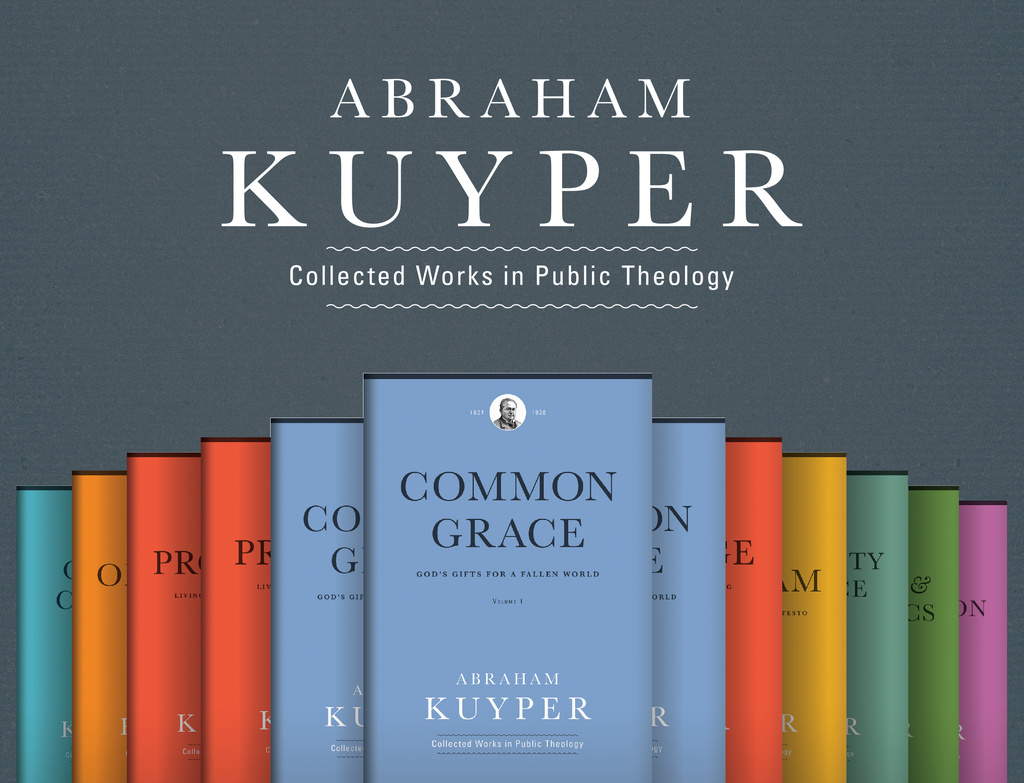
Wow. There is a Kuyper translation project going on, a very ambitious effort to translate and produce usable, sturdy volumes of some of his “public theology” work that has never been translated into English. Some of these are now available in nicely done editions, with informative introductions and helpful annotations, in a slightly oversized hardback format, allowing for a nice type font. Of course, we have them all — and more are yet to come. So far, the far-flung and hard-working team of scholars and translators have created these impressive volumes through a remarkable, ecumenical partnership between the Acton Institute, the Kuyper Translation Society and Lexham Press. Each sell for $49.99 and we have them at the BookNotes 10% off. We’d be delighted to send any of these five to you.
Common Grace: God’s Gifts for a Fallen World Part One
Pro Rege: Living Under Christ the King Part One
Pro Rege: Living Under Christ the King Part Two
Our Program: A Christian Political Manifesto
On the Church
Here is a pleasant and interesting interview with RIchard Mouw and James Bratt about the importance of these big volumes. You may have to scroll down a tiny bit to get to it after the link. And be sure to come back!
BOOKS BY TIMOTHY KELLER
Timothy Keller has written widely as a pastor and Bible teacher, as an apologist for skeptics and seekers, and as a leader of a global church-planting network. Like Kuyper, he’s interested in orthodox Calvinist theology and notions of common grace, civic virtue, the arts, cultural renewal, good fiction, and the flourishing of the common good.
But he is, after all, firstly a pastor.
His books for educated lay folks on prayer, marriage, justice, mercy ministries, on the nature of grace, 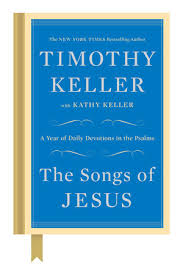 and various studies from the gospels are all thoughtful, insightful, and very helpful. Many pastors find them very useful in preparing their own studies and sermons although they are not exceedingly scholarly and any thoughtful reader can take them up. From his recent devotional (written with his wife,
and various studies from the gospels are all thoughtful, insightful, and very helpful. Many pastors find them very useful in preparing their own studies and sermons although they are not exceedingly scholarly and any thoughtful reader can take them up. From his recent devotional (written with his wife, 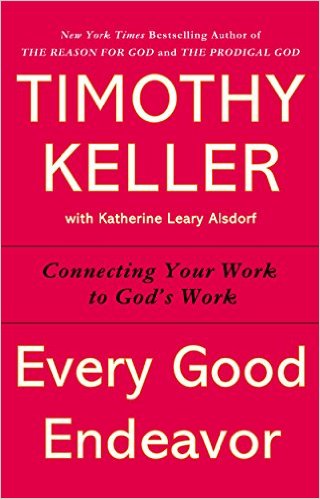 Kathy Keller) on the Psalms (The Songs of Jesus) to his excellent book co-authored with former corporate exec, Katherine Leary Alsdorf, Every Good Endeavor: Connecting Your Work to God’s Work, to the older, but still very popular short take on the misunderstood Prodigal Son story, The Prodigal God: Recovering the Heart of Christian Faith, Keller
Kathy Keller) on the Psalms (The Songs of Jesus) to his excellent book co-authored with former corporate exec, Katherine Leary Alsdorf, Every Good Endeavor: Connecting Your Work to God’s Work, to the older, but still very popular short take on the misunderstood Prodigal Son story, The Prodigal God: Recovering the Heart of Christian Faith, Keller 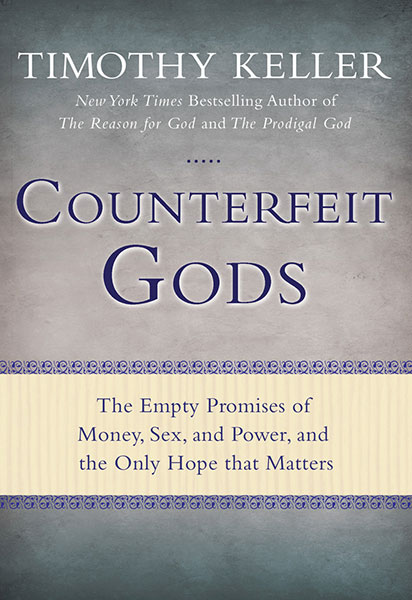 has a way with words that are lucid and often thought-provoking. His Counterfeit Gods: The Empty Promises of Money, Sex, and Power, and the Only Hope That Matters is a very serious critique of modern idols; oh, if other evangelical (or progressive) thinkers were so incisive and so clear and so gospel-centered.
has a way with words that are lucid and often thought-provoking. His Counterfeit Gods: The Empty Promises of Money, Sex, and Power, and the Only Hope That Matters is a very serious critique of modern idols; oh, if other evangelical (or progressive) thinkers were so incisive and so clear and so gospel-centered.
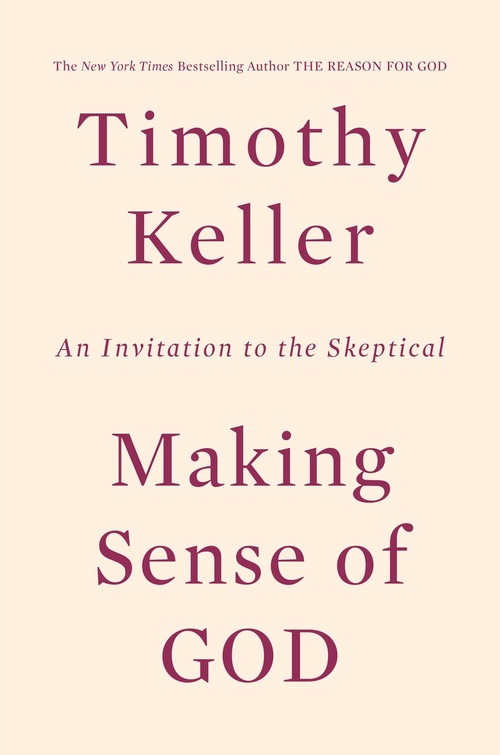
 Mr. Keller has two books that are designed for seekers or those intellectually struggling with the plausibility of faith in the modern world. His paperback The Reason for God: Belief in an Age of Skepticism is, again, thoughtful, well written, and a bit more serious than some may want. But in his world of sophisticates in lower Manhattan, this was the book needed to explore with skeptics their doubts, fears, and frustrations with faith and it’s reasonableness. A prequel came out this last year, still only in hardback, called Making Sense of God: An Invitation to the Skeptical and in it, he covers ground that is needed now more than ever. That is, there are some who are not even open to debate the “reasonableness of God” as in his earlier book; this backs up to those who can’t even suppose there is a God or a God that matters. It is a bit heavy and is a good example of nuanced, literate, contextualized apologetics.
Mr. Keller has two books that are designed for seekers or those intellectually struggling with the plausibility of faith in the modern world. His paperback The Reason for God: Belief in an Age of Skepticism is, again, thoughtful, well written, and a bit more serious than some may want. But in his world of sophisticates in lower Manhattan, this was the book needed to explore with skeptics their doubts, fears, and frustrations with faith and it’s reasonableness. A prequel came out this last year, still only in hardback, called Making Sense of God: An Invitation to the Skeptical and in it, he covers ground that is needed now more than ever. That is, there are some who are not even open to debate the “reasonableness of God” as in his earlier book; this backs up to those who can’t even suppose there is a God or a God that matters. It is a bit heavy and is a good example of nuanced, literate, contextualized apologetics.
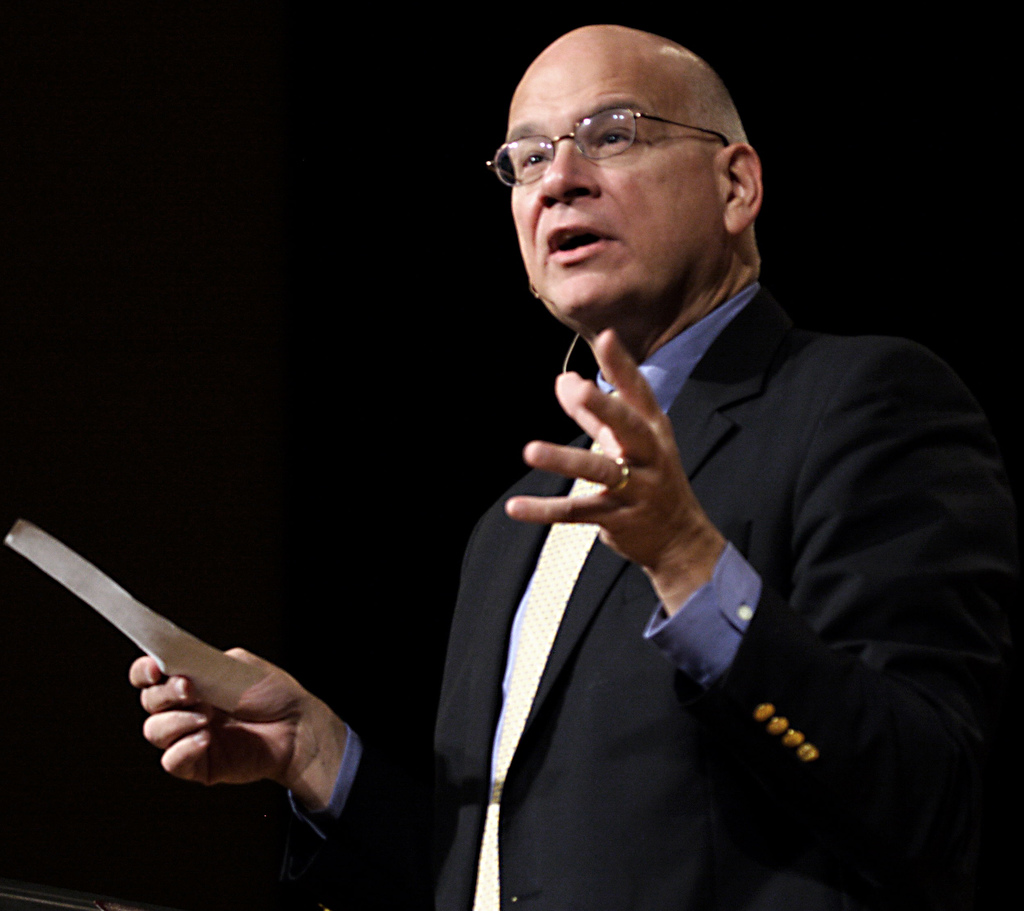 In each of the times I’ve heard him lately he has talked about the deep Canadian philosopher Charles Taylor and cited the likes of Robert Bellah. He is known to be friends with David Brooks; he quotes Lesslie Newbigin. He obviously reads Tolkien but also contemporary social criticism and sociology. Although not trendy, he lives in New York and is au current with the essays in Atlantic or New Yorker and the like. To say he is a bit bookish would be an understatement.
In each of the times I’ve heard him lately he has talked about the deep Canadian philosopher Charles Taylor and cited the likes of Robert Bellah. He is known to be friends with David Brooks; he quotes Lesslie Newbigin. He obviously reads Tolkien but also contemporary social criticism and sociology. Although not trendy, he lives in New York and is au current with the essays in Atlantic or New Yorker and the like. To say he is a bit bookish would be an understatement.
His book from just a few years ago, Walking with God Through Pain and Suffering, is a combination of all of his styles — the first part is fairly theoretical and philosophical (answering the “theodicy” question of why) while other portions are theological and Biblical. Yet other sections are eminently practical, offering wise counsel from a caring pastor. In this regard it is an extraordinary book.
I could go on. If you read our BookNotes newsletter you may know that we’ve mentioned almost all of his books at one point or another. He has some brand new devotional commentaries (hardbacks) based on certain books of the Bible. He’s a good, grace-filled, gospel-centered Bible teacher, honest before the text but not innovative or unusual. His small book simply called Preaching: Communicating Faith in an Age of Skepticism is good for anyone who does Bible teaching, runs a small group or has any leadership role in the educational ministry of the church. And — not surprisingly — he has an excellent chapter therein summarizing Charles Taylor’s The Secular Age. Again, perhaps in the spirit of Kuyper, Keller relates orthodox, Calvinist faith to the urgencies of the day, and he brings a Christ-centered framework to everything he writes about. This is seen in the title and subtitle in his nice little book arguing for deeper commitments to social justice: Generous Justice: How God’s Grace Makes Us Just.
It is this sort of generous and wholistic approach that informed my own faith as a young Christian in the mid 1970s. I am grateful for the way Keller and those in his movement have attempted to be agents of transformation in mostly urban areas, standing for social justice and racial reconciliation and holding out a vision for the arts, for science, for relating faith to the world-world. They’ve graciously welcomed seekers and cynics, even as they’ve upheld classical, historic orthodoxy. There are concerns, naturally, about any renewal movement or mega-church, or rock star pastor, but, by and large, Redeemer under the leadership of Keller and his team, has been extraordinarily effective. It is not perfect and I do not agree with some of the tendencies and positions of their denomination, but so what? They’ve cared well for people I know, their counseling center has brought healing and hope to the hurting, and the proclamation of the basics of the gospel has born good fruit. They’ve done good work and I am glad to say so.
Here are four items that I think I should tell you about, a DVD and three books, that, if studied well, might illustrate more about why Keller was going to be honored by the Kuyper Center as they kicked off their annual Kuyper conference at Princeton Seminary.
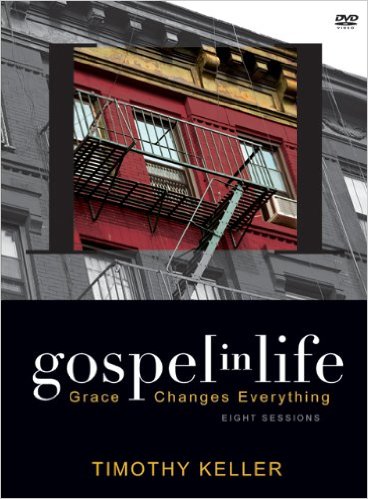 Gospel in Life: Grace Changes Everything (DVD and study book) Timothy Keller (Zondervan) $36.99 This is a classy DVD curriculum that offers eight fairly brief mini-lectures by Keller coupled with a very thorough (230 page) workbook for participants to process the information. In some cases, some DVD participant’s guides aren’t always necessary but in this case, the Gospel In Life workbook is an amazing resource and each participant must have one, as it includes much of the content of the course, lots of discussion stuff, a narrative from Keller, and more. (Extra Participant’s Guides sell for $12.99 each without the DVD.)
Gospel in Life: Grace Changes Everything (DVD and study book) Timothy Keller (Zondervan) $36.99 This is a classy DVD curriculum that offers eight fairly brief mini-lectures by Keller coupled with a very thorough (230 page) workbook for participants to process the information. In some cases, some DVD participant’s guides aren’t always necessary but in this case, the Gospel In Life workbook is an amazing resource and each participant must have one, as it includes much of the content of the course, lots of discussion stuff, a narrative from Keller, and more. (Extra Participant’s Guides sell for $12.99 each without the DVD.)
The sessions include eight 10-15 minute astute teaching presentations from Keller and then the participants workbook and discussion resources.
The topics include:
1. City – The World That Is
2. Heart – Three Ways To Live
3. Idolatry – The Sin Beneath The Sin
4. Community – The Context For Change
5. Witness – An Alternate City
6. Work – Cultivating The Garden
7. Justice – A People For Others
8. Eternity – The World That Is To Come
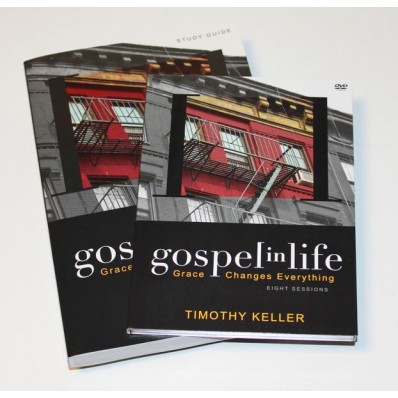 As you can see, this includes some visionary stuff — the nature of the city, the significance of work, the importance of justice, the promises of a (re)new(ed) creation, God’s Kingdom coming “on Earth as it is in Heaven” — and it is all rooted in some formational teachings about the nature of the heart, the struggle with trusting God (“the sin beneath the sin” of idolatry) and an invigorating call to community which is “the context for change.” I just don’t know anyone doing this kind of multi-dimensional teaching, bringing together classic, historic doctrines with fresh and relevant application to the modern world.
As you can see, this includes some visionary stuff — the nature of the city, the significance of work, the importance of justice, the promises of a (re)new(ed) creation, God’s Kingdom coming “on Earth as it is in Heaven” — and it is all rooted in some formational teachings about the nature of the heart, the struggle with trusting God (“the sin beneath the sin” of idolatry) and an invigorating call to community which is “the context for change.” I just don’t know anyone doing this kind of multi-dimensional teaching, bringing together classic, historic doctrines with fresh and relevant application to the modern world.
One needn’t be a follower of Abraham Kuyper to get to this place, but it seems to be that Keller was influenced during his seminary days learning about Kuyper and a Reformed worldview (from urban, missional activists such Harvie Conn and Ortega that pushed him into this integrated, culturally-engaged approach to ministry.

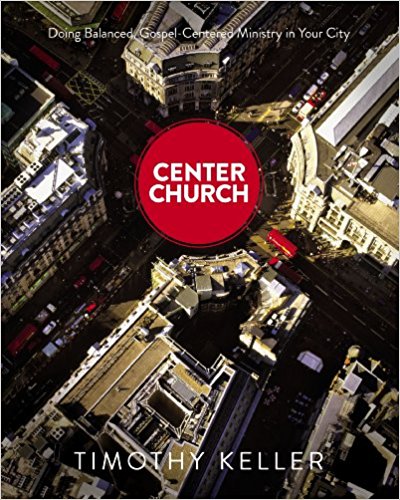 Center Church: Doing Balanced, Gospel-Centered Ministry in Your City Timothy Keller (Zondervan) $34.99 In the Fall of 2012 Keller, surely with good help from his innovative, missional team, released a major work, this big Center Church textbook-like volume. We named it one of the Books of the Year that year and we told many — even folks in smaller towns and in smaller churches — that his emphasis on a “gospel-centered” ministry that was balanced and informed by the first things of the gospel was profound and needed.
Center Church: Doing Balanced, Gospel-Centered Ministry in Your City Timothy Keller (Zondervan) $34.99 In the Fall of 2012 Keller, surely with good help from his innovative, missional team, released a major work, this big Center Church textbook-like volume. We named it one of the Books of the Year that year and we told many — even folks in smaller towns and in smaller churches — that his emphasis on a “gospel-centered” ministry that was balanced and informed by the first things of the gospel was profound and needed.
That was the first third of the book, describing what is meant by the gospel, why it “isn’t everything” but must affect everything, even though it dare not be understood simplistically.
His second section explored an overview of a sense of place and what it means to care for real culture, the social and even literal architecture of our built environments, why we should attend to institutions and seek to transform the ethos of the city and its social landscape. It was visionary and Biblical and nearly, at times, an “evangelical social gospel.” Much of this, I seem to recall, drew on Kuyper via other contemporary writers, all good. Even the “missional church” writers who make much of being discerning about and engaging within North American post-Christian culture haven’t always done this kind of solid work evaluating and making a case for thoughtful cultural involvement and renewal. I really think this is good stuff, and, agree or not, it is must-reading for anyone serious about the thriving of their local congregations. If you’ve liked my recent recommendations of titles such as Staying is the New Going by Alan Briggs or Renovate: Changing Who You Are By Loving Where You Are by Leonce Crump, and if you’ve read Andy Crouch’s Culture Making, for instance, you will appreciate this material.
The third section of that whopper of a book is divided up into two parts. The first part is about forming missional community — connecting people to God and to other people, ministering in ways that he calls “integrative.” This is just excellent stuff, realizing that helpful ministry must be wholistic and on many fronts. Every pastor will intuit this but few say it so convincingly and few do it so well. The next portion is perhaps farther away from the lived experiences of many churches and church leaders but it made the case for creating a renewal campaign, a church-to-church network, and missional ecumenism of orthodox believers wanting to advance a movement, which, naturally, includes sharing resources and networking and church planting. It is this third aspect of Keller’s magnum opus that will take his attention when he retires from Redeemer Presbyterian at the end of this year as he focuses more on the Redeemer City-to-City organization. They have, thus far, helped launch more than 350 churches in fifty global cities. This has happened, recall, from scratch, starting when Tim and Kathy and their children moved to New York about 25 years ago when there was hardly an evangelical church that was taken seriously in Manhattan. I know whole denominations who haven’t planted that many churches in the last 25 years…
And so, that big Center City book was great and it seems to me one further example of his Kuyperian vision: the gospel come first but it is essentially tied to a renewal of “all things.” We don’t just promote individualistic salvation nor our own congregation. We are joining in God’s “cosmic re-ordering of things.” This is not a simple “get saved” message but it includes inviting people into profound flourishing, even in their work and public life. Keller shows that we must care about people, about culture, about cities and places, and about reaching out in communal efforts to bring transforming grace to others within their contexts. No one church can do it all and we must see our local mission as part of a larger Kingdom agenda. Quibble as I might about a handful of passages or strategies, I want to shout Amen. Yes and yes and yes.
CENTER CHURCH REDUX
And, now, here is what is fascinating. I do not know who came up with this grand, great idea, but the three portions of that big book have been each republished — revised, too — and repackaged as individual books.
Further, in a move that makes them that much more interesting and useful, each volume has two or more new contributors, adding excellent short chapters of their own, and then a new chapter by Keller responding to the input of each of the new contributors. This makes these three books so very interesting and we highly recommend all three. For the record, I wish the authors — who are all from outside Keller’s own Redeemer network — were a bit more diverse, even though they have some disagreements and offer refinements to his project. I’d have liked some very different sorts of voices.
Here are the three new titles and the new authors that have helped in these new, expanded editions. To see Keller responding to voices like Gabriel Salguero and Andy Crouch and Alan Hirsch, is very informative, classy, and good.
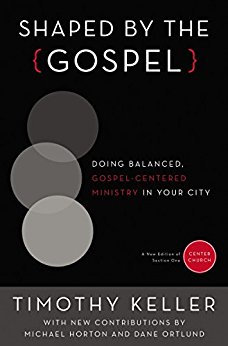 Shaped by the Gospel: Doing Balanced, Gospel-Centered Ministry in Your City Timothy Keller, with new chapters by Michael Horton and Dane Calvin Ortlund (Zondervan) $15.99
Shaped by the Gospel: Doing Balanced, Gospel-Centered Ministry in Your City Timothy Keller, with new chapters by Michael Horton and Dane Calvin Ortlund (Zondervan) $15.99
This, as we’ve explained, includes some new material, but it is mostly drawn from the first section of Center Church. It is very, very important to get this stuff right and although most of us think we can easily answer the query “what is the gospel?” this rumination is still invaluable, especially, then, when we seek to do ministry in a gospel-centered way. What does that mean and what does that look like? Highly recommended.
Here is the table of contents:
Part 1: Gospel Theology:
1. The Gospel Is Not Everything
2. The Gospel Is Not a Simple Thing
3. The Gospel Affects Everything
Reflection: What Is The Gospel? (Michael Horton)
Response to Michael Horton
Part 2: Gospel Renewal:
4. The Need for Gospel Renewal
5. The Essence of Gospel Renewal
6. The Work of Gospel Renewal
Reflections on Gospel Renewal (Dane Ortlund)
Response to Dane Ortlund
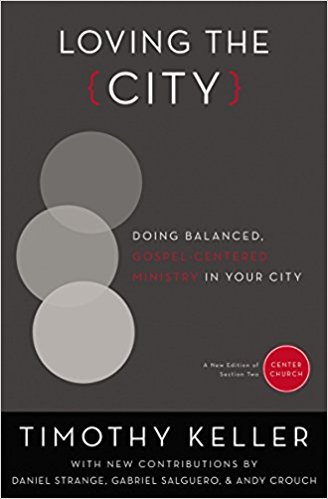 Loving the City: Doing Balanced, Gospel-Centered Ministry in Your City Timothy Keller, with new chapters by Daniel Strange, Gabriel Salguero, and Andy Crouch (Zondervan) $18.99
Loving the City: Doing Balanced, Gospel-Centered Ministry in Your City Timothy Keller, with new chapters by Daniel Strange, Gabriel Salguero, and Andy Crouch (Zondervan) $18.99
I love this second paperback volume, the center portions of the Center Church. Although it is written out of Keller’s work in a major urban center, it is great reading for any of us. Don’t miss Andy Crouch’s good input and Keller’s reply.
Here are the table of contents. Great stuff!
Part 1: Gospel Contextualization
1. Intentional Contextualization
2. Balanced Contextualization
3. Biblical Contextualization
4. Active Contextualization
Reflection on Gospel Contextualization (Daniel Strange)
Response to Daniel Strange
Part 2: City Vision
5. The Tension of the City
6. Redemption and the City
7. The Call to the City
8. The Gospel for the City
Reflection on City Vision (Gabriel Salguero)
Response to Gabriel Salguero
Part 3: Cultural Engagement
9. The Cultural Crisis of the Church
10. The Cultural Responses of the Church
11. Why All the Models are Right…and Wrong
12. Cultural Engagement Through Blended Insights
Reflection on Cultural Engagement (Andy Crouch)
Response to Andy Crouch Timothy Keller
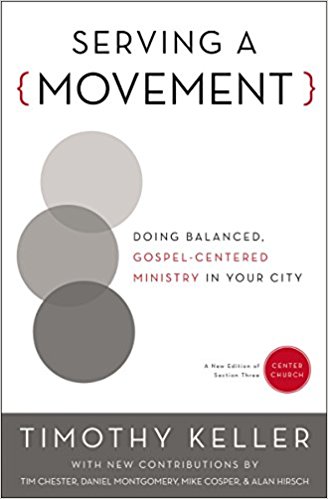 Serving a Movement: Doing Balanced, Gospel-Centered Ministry in Your City Timothy Keller, with new chapters by Tim Chester, Daniel Montgomery, Mike Cosper and Alan Hirsch (Zondervan) $18.99
Serving a Movement: Doing Balanced, Gospel-Centered Ministry in Your City Timothy Keller, with new chapters by Tim Chester, Daniel Montgomery, Mike Cosper and Alan Hirsch (Zondervan) $18.99
This third one in the new paperback expanded editions of Center Church is fabulous, and I hope you consider getting it. It offers Keller’s very perceptive and balanced approach to what it means to be missional, what forming a relational, supportive community — the living church — might entail, and what that “integrative” effort demands. The first portion of this is great.
The second part is equally fascinating, about joining with others, sharing resources, building networks, building a movement of the Kingdom. I love this, and that he moves towards the global church and world-wide missions is essential. It is, need I remind us all, the way of the future.
Here’s what the chapter titles are. I hope you find it interesting,
Part 1: Missional Community
1. The Search for the Missional Church
2. Centering the Missional Church
3. Equipping People for Missional Living
Reflections on Missional Community (Tim Chester)
Response to Tim Chester
Part 2: Integrative Ministry
4. The Balance of Ministry Fronts
5. Connecting People to God
6. Connecting People to One Another
7. Connecting People to the City
8. Connecting People to the Culture
Reflections on Integrative Ministry (Matt Chandler)
Response to Matt Chandler
Part 3: Movement Dynamics
9. Movements and Institutions
10. The Church as a Dynamic Organism
11. Church Planting as a Movement Dynamic
12. The City and the Gospel Ecosystem
Reflection on Movement Dynamics (Alan Hirsch)
Response to Alan Hirsch
I don’t know what to think about so many issues these days, and I find myself seeing many sides of most things. This sad situation at Princeton Theological Seminary around the Kuyper Center Award and Keller’s lecture there — he is still giving the lecture at the annual Kuyper conference in early April — leaves me unsure and vexed. I want to stand with those who may be marginalized by Keller’s church and approach, although it is clear in my estimation that he has done much good in the world and not much harm. I don’t like how some evangelicals have come away smug about this and I don’t like how some critics have painted him unfairly. I get why PTS made their decision, and I am glad Keller is showing up to share his vision with the gathered Kuyper types. May God bless their efforts as we all stumble along, trying to honor God and make the world a somewhat brighter place.
A looming question for me feels like it is somehow connected to our future as booksellers. We are sincere and not naive about suggesting these books; none are really righteous, nobody is innocent. Still, I wonder whether the general vision of old Abe K as lived out, imperfectly, in the work of Redeemer Presbyterian (from their low-cost counseling center to their anti-racism project, from their respected Center for Faith and Work to their on-going Bible studies all over the city, from their significant social service care ministries to their mature and inviting worship that draws thousands of previously unchurched each week) and the church-planting, City-to-City network for which Tim was to be honored by the Kuyper Center — which, by the way, includes planting non-PCA churches — might somehow point us all towards a more relevant and effective faith lived out in these times.
Lament and oppose his unhelpful stances where you must. But don’t neglect knowing what he has written, books that have helped many and see what you can learn from his energetic, fruitful efforts over these last years.
And don’t miss learning about Abraham Kuyper, also a fallen person, stuck in his times, but who, through God’s grace, still has very much to offer us today. Hearts & Minds is eager to offer resources to the wider church, books like this that we think are worth knowing about. We are grateful that you’ve read this far and continue to be interested in our work.
Soon I will review the new Carol Howard Merritt book, Healing Spiritual Wounds: Reconnecting with a Loving God After Experiencing A Hurtful Church (HarperOne; $25.99.) I found it deeply moving and important and while I didn’t like her piece against Keller quite so much, I found Healing Spiritual Wounds to be a very good and useful book. It moved me to tears at points and it made me stop and wonder how I’ve caused hurt as I’ve expressed my faith over the years. I’m eager to tell you more about it soon. Thanks for caring.
BookNotes
DISCOUNT
ANY ITEM MENTIONED
10% off
order here
takes you to the secure Hearts & Minds order form page
just tell us what you want
inquire here
if you have questions or need more information
just ask us what you want to know
Hearts & Minds 234 East Main Street Dallastown, PA 17313
717-246-3333

